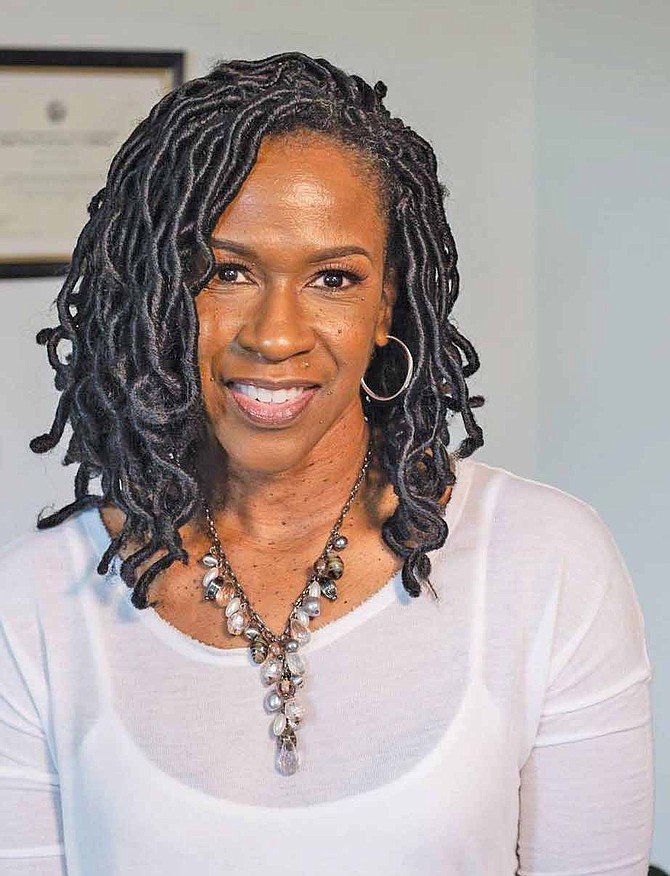You Matter Summit Aims To Enlighten People About the Impact of Long-Term Prison Sentences
You Matter Summit Aims To Enlighten People About the Impact of Long-Term Prison Sentences
By Tia Carol Jones
A day-long summit designed to share the experiences of those who were formerly incarcerated will take place at Kennedy-King College on Wednesday, April 24th. The You Matter Summit, hosted by the Darren B. Easterling Center for Restorative Practices, in partnership with the Field Foundation of Illinois and Illinois Humanities, will highlight the consequences extended prison stays have on those who are incarcerated, their families and the community.
Lisa D. Daniels founded the Darren B. Easterling Center for Restorative Practices (The Center) with the goal to develop trauma-informed solutions to support communities of color that are impacted by mass incarceration and violent crime. Daniels named The Center after her son, Darren B. Easterling, who was a victim of gun violence, with the hope to change the narrative surrounding his legacy, along with the legacy of young men like him, to one that shines a light on hope, promise and love.
Dr. Kathryn Bocanegra, assistant professor at the University of Illinois at Chicago Jane Addams College of Social Work, will moderate a panel that includes people who are formerly incarcerated, a journalist and author who has written about the carceral system, as well as a mental health professional, as they discuss the impact of long-term prison sentences. Daniels will be moderating a panel of formerly incarcerated individuals who will share their story and experiences.
Daniels said she created the summit as an extension of The Center’s You Matter program. The program helps to heal the trauma for men of color who have served long-term prison sentences. Fifty individuals who served 10 years or more were interviewed about their experience, family and intimate partner relationships and their re-entry experience as part of a needs assessment. From that, the content was used for an audio project with the goal of sharing the humanity of the experience of those who have been incarcerated. As someone who works on the Illinois Prisoner Review Board, Daniels is in direct contact with people who have experienced long-term prison sentences, and she has seen the impact firsthand.
Daniels talked to Bocanegra about the idea to host the summit and share the stories of the formerly incarcerated individuals. The hope is that people will see the humanity of those who have experienced long-term prison sentences.
“The way that Lisa approaches her work is really through a multi-layered, multipronged effort around supporting individuals who have been impacted in systems change,” Bocanegra said. She added that the summit is to promote systems change and create connections based on the shared humanity of everyone involved.
The week the summit will take place is recognized as National Second Chance Week and National Crime Victim’s Rights Week. Organizations across the country acknowledge the re-entry experience of those who have been incarcerated and those who have experienced violent crime or who have lost a loved one to violent crime. While Daniels doesn’t think the recognition of these two things was done on purpose, she thinks it is worth noting.
“These two categories of people who are often separated by systems, and purposefully so, more often than not to further system agendas, are actually recognized on a national level at the same time and I think it’s important to note that because studies show that individuals who have caused harm, who have caused enough harm to be incarcerated for something they’ve done, have often been harmed themselves,” she said.
One of the things the You Matter program sets out to do is help individuals, at the minimum, scratch the surface of the harm they’ve experienced prior to incarceration. That harm can include dysfunctional homes and unaddressed adverse childhood experiences. Daniels said all of those can play a role in shaping a human who has caused harm, and those things go unaddressed in the carceral system. She added, the carceral experience can add another layer of trauma to them.
Daniels believes that by sharing the perspective of those in the social justice space with those who might not agree with that perspective, it can implement change. Bocanegra said that by having media involved in the conversation around the experiences of incarcerated and formerly incarcerated people, it can help people understand the system those individuals have to navigate and where people can support them in developing more comprehensive and more humanistic narratives. This acknowledgement of the experiences and humanity of those who are incarcerated and formerly incarcerated is at the center of Daniel’s work.
“It was important for me then, and it is important for me today, to give people opportunities to have their humanity acknowledged through the sharing of their very human stories. What we’ll find, oftentimes, is that we’re not too much different than the people we judge and criticize, if we just knew more about who they were,” Daniels said.
The You Matter Summit will take place from 9 a.m. to 3 p.m. on Wednesday, April 24th, at Kennedy King College, located at 740 W. 63rd St. For more information, visit https://tinyurl.com/5xmd8fpp. For more information about the Darren B. Easterling Center for Restorative Practices, visit dbcenter.org.
Latest Stories
- Leaders Network Financial and Great Lakes Credit Union Open Permanent Branch in Austin Neighborhood of Chicago
- DUSABLE MUSEUM TRUSTEE CAROL MOSELEY BRAUN APPOINTED CHAIRMAN OF THE U.S. AFRICAN DEVELOPMENT FOUNDATION
- ASSESSOR HOSTS 2024 MARKET INVESTOR DAY
- One Night Only Performance Show Dance Company Entering ‘New Horizons’
- New Choice Intervention Provides Much Needed Mental Health Services To The Community
- University of Chicago Program Brings Mavis Staples To Campus
- Larry’s Barber College Set For Expansion Of Facility And Education Programs
- Art Exhibit Shows And Tells The Stories Of Widows
- Introducing Shot Bar's New Location
- Illinois Reparations Coalition Advocates for Guaranteed Income Program as Drug War Reparations
Latest Podcast
Sydney Blaylock-The local skater with national experience

